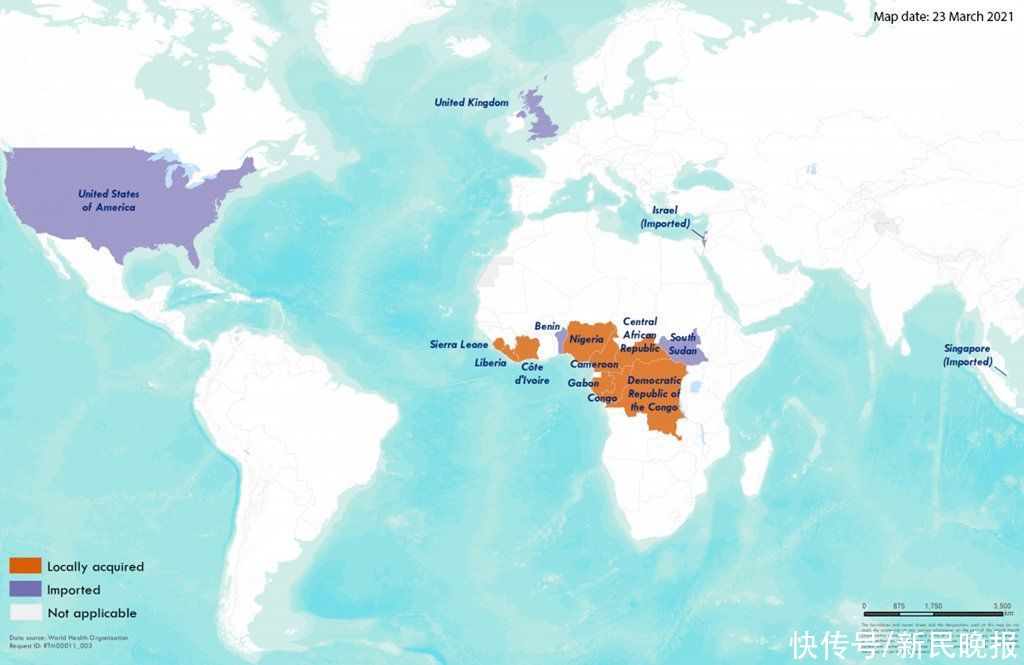“Monkeypox is not a coronavirus.” Regarding the panic of some people about monkeypox, Tara Smith, a professor of epidemiology at Kent State University in the United States, emphasized that humans have “played hands” with monkeypox, and they are by no means ignorant.
From May 13 to 21, 2022, nearly 100 confirmed cases of monkeypox were reported in 12 non-monkeypox-endemic countries around the world, while suspected cases There are also 28 cases.
However puzzlingly, none of these cases had a history of travel to Africa.
“This is an extremely unusual thing.” The WHO warned on the 21st that as the scope of surveillance expands, more monkeypox cases may be detected. Find.
unusual
according to WHO report , Benin, Cameroon, Central African Republic, Democratic Republic of Congo, Gabon, Ghana, Côte d’Ivoire, Liberia, Nigeria, Republic of Congo, Sierra Leone, South Sudan, these are the countries where monkeypox is endemic.
The endemic countries with confirmed cases from December 15 last year to May 1 this year are mainly Cameroon, Central African Republic, Democratic Republic of Congo and Nigeria.
However, the confirmed or suspected cases from non-endemic countries since May 13 have no clear travel history to monkeypox endemic areas. Most cases in the UK are not linked to each other, with the exception of one reported on 5 May who travelled to Nigeria.

Reported human infection with monkeypox from 1970 to 2021 Map of the country distribution of cases. Source: WHO
“Historically, imported cases (of monkeypox) are rare.” London School of Hygiene and Tropical Medicine “Before this year, this had only happened eight times,” said Jimmy Whitworth, a professor of international public health. Portugal, which has five confirmed cases, and Spain, which has reported 23 suspected cases, have never had monkeypox before. case. In response, Whitworth described the monkeypox case as “very unusual” in a non-endemic country or region.
So, where did they get the infection?
In Whitworth’s view, after more than two years of the new crown epidemic, some countries have recently eased travel restrictions, and this may be the case of monkeypox. The main reason in non-endemic countries and regions.
But fortunately, the viruses infected in these cases are homologous to the strains imported from Nigeria to the UK, Singapore and Israel in 2018 and 2019, all belonging to West African strains . The West African strain, which has a 1% fatality rate, is milder than the Congolese strain, which has a 10% fatality rate.
hands-on
faced with such a ” “Extremely unusual event”, WHO said surveillance in monkeypox non-endemic areas had been weak but was now being expanded. The available information suggests that human-to-human transmission of monkeypox has occurred. More monkeypox cases may be detected in the future as surveillance is expanded.
But “monkeypox is not a new coronavirus”. Regarding the panic of some people about monkeypox, Tara Smith, a professor of epidemiology at Kent State University in the United States, emphasized that humans have “played hands” with monkeypox, and they are by no means ignorant. “We’ve known this virus for decades, and most critically, we have a vaccine and a treatment. That means we’re not starting from scratch.”

Rodents are the main hosts of monkeypox. Source: independent
The virus was first discovered in monkeys in 1958, giving the virus its name “monkeypox”, but in fact its main The animal hosts are rodents. Several African rodents, in particular, can carry and transmit the virus without obvious symptoms. Monkeypox virus can be transmitted between animals or humans through close contact of foci, body fluids, respiratory droplets, and bedding and other pollutants. The incubation period is usually 6 to 13 days, but it can be 5 to 21 days.
A large number of monkeypox cases were reported in the United States in 2003, the first time the disease had appeared outside of Africa. Subsequent investigations found that most of the patients had contact with purchased pet marmots before they became ill, and these marmots had been raised with Gambian giant rats, dormouse and squirrels imported from Ghana.
The top priority is to block the spread of monkeypox virus. According to the known information about the characteristics of monkeypox virus, compared with the new coronavirus, the transmission chain of monkeypox is easier to break, especially now that monkeypox is still in the early stage of transmission. Available evidence suggests that the highest risk of infection in human-to-human transmission is in those who have had close physical contact with a symptomatic monkeypox patient.
In addition, vaccination and the use of antiviral drugs can help treat already infected cases, or “ring vaccinations” for people who may have been exposed to confirmed cases , thereby limiting the potential spread of the virus.
Ready
Based on what humans know, It seems unlikely that monkeypox will cause a pandemic like Covid-19, but the large number of cases in non-endemic countries this time means there is still much unknown: whether the virus has evolved to become more like its “cousin” smallpox , easier to spread from person to person? Does reduced immunity to poxviruses in humans lead to monkeypox…

< strong>Monkeypox virus under electron microscope. Source: Reuters
For centuries, humans have acquired immunity to the smallpox virus through infection and vaccination, even worldwide It eradicated the smallpox epidemic that had raged for 3,000 years. Tara Smith pointed out that with the cessation of routine vaccination against smallpox since the 1980s, “this is the first time in modern times that such a large proportion of the population has lacked immunity to these poxviruses”.
“It is a serious outbreak of a serious disease, and we should take it seriously.” Whitworth believes that it is necessary to conduct a timely investigation of newly discovered cases. Because “they could indicate a new mode of transmission or a change in the virus, which is all to be determined”.
Tara Smith also believes that although a monkeypox pandemic is unlikely, “we should be vigilant, be prepared, be quick and nimble when necessary. respond accordingly”.
Produced by Deep Sea Studio
Writing Deep Sea Salmon
Editing Deep Sea Moe